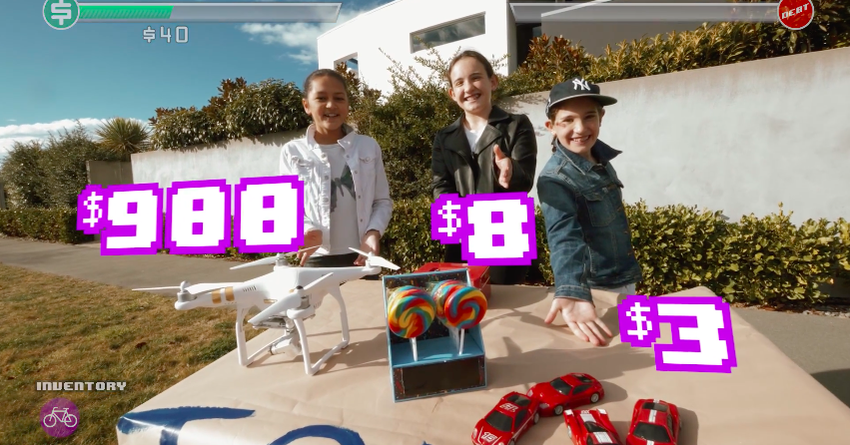
It’s partly the reason why this year’s Sorted Money Week, which ran from the 14-20 August, focused on the theme of debt, with a snapshot online survey finding that while debt weighed heavily on our minds, many of us still believed we deserved to have money to spend.
These attitudes and habits don’t just suddenly appear; often they become entrenched from a young age as financial literacy gets put on the back burner. So in an effort to tackle the cycle of debt from the root of the cause, Christchurch-based startup Banqer has come up with a clever idea to challenge kids (and adults) to exercise careful consideration and financial restraint.
The series, called ‘Can You Destroy The Debt?’, begins with you—the player–being given $40 worth of pocket money. You then head out of the house to start your day, but before long, you come across a stall on the side of the road. This is where the video’s interactive side comes in as a series of three videos pop up on the screen as annotations, offering you the chance to purchase either toys ($3), lollies ($8) or a drone (a whopping $900).
Each choice leads to a different outcome as your spending puts you in a diverse range of financial situations ranging from prompt repayment to years of crippling debt.
To produce the series, Banqer worked with Snorkel, a creative video company based in Christchurch. Previously, the two worked together when Banqer road-tripped to Greymouth last year to celebrate its 1000th classroom milestone.
“In terms of the initial idea, we wanted something fun and engaging that would kick-start a conversation around debt and provide some experiential learning,” says Simon Brown, growth lead at Banqer.
“There are so many quality educational resources out there in print, and we didn’t want to reinvent the wheel so we knew our approach had to be novel.”

“As kids of the 90s, a lot of [the team at] Banqer fondly remember the pick-a-path books of our childhood. These were fun as you really felt like you were driving the ship, and it also meant a longer shelf life in that you could try a few different options and have a completely different experience. This felt like the modern equivalent of those so we loved the idea,” Brown says.
Banqer is certainly no stranger to interactive learning as it’s made a name for itself in the edutech sector, offering financial education software that allows students to learn about earning and spending based on classroom-based activities. Earlier this year, the company entered a new phase of its start-up development when it announced it would be expanding into Australia.
Brown goes on to explain that when it came to how it wanted the video to be perceived, it wanted to create something that was ‘Disney’, meaning that teachers and parents wouldn’t hate watching it either.
“We saw this as something that might be played in the classroom given our audience,” he says. “Best case scenario would be that teachers and parents would enjoy it and learn something too, but our primary audience was still kids.”
Naturally, kids played a major role in executing the series with students from Christchurch’s St Martins School offering their acting services to play the lead parts.
“It took a few creative sessions…to nail down the storyline. Strangely enough, we didn’t want to get too bogged down on figures. Instead, we picked three key debt-lessons we wanted to pass on and tried to keep things reasonably high level,” explains Brown.
“From there the team at Snorkel worked with a few passionate Banqer students at St Martins School to come up with the finished product.”
‘Can You Destroy The Debt?’ wasn’t the only initiative launched for Sorted Money Week, with the Commission for Financial Capability linking up with the Reserve Bank to create the ‘Take Note’ and ‘Birds of a Feather’ video series. It also challenged students from the Media Design School to come up with a campaign to mark this year’s Sorted Money Week, with the winning idea featured on billboards, at events and across social media. Students were given four weeks to create a concept that would appeal to young Pacific people, with ‘Be Royal’ being crowned the winning idea.





